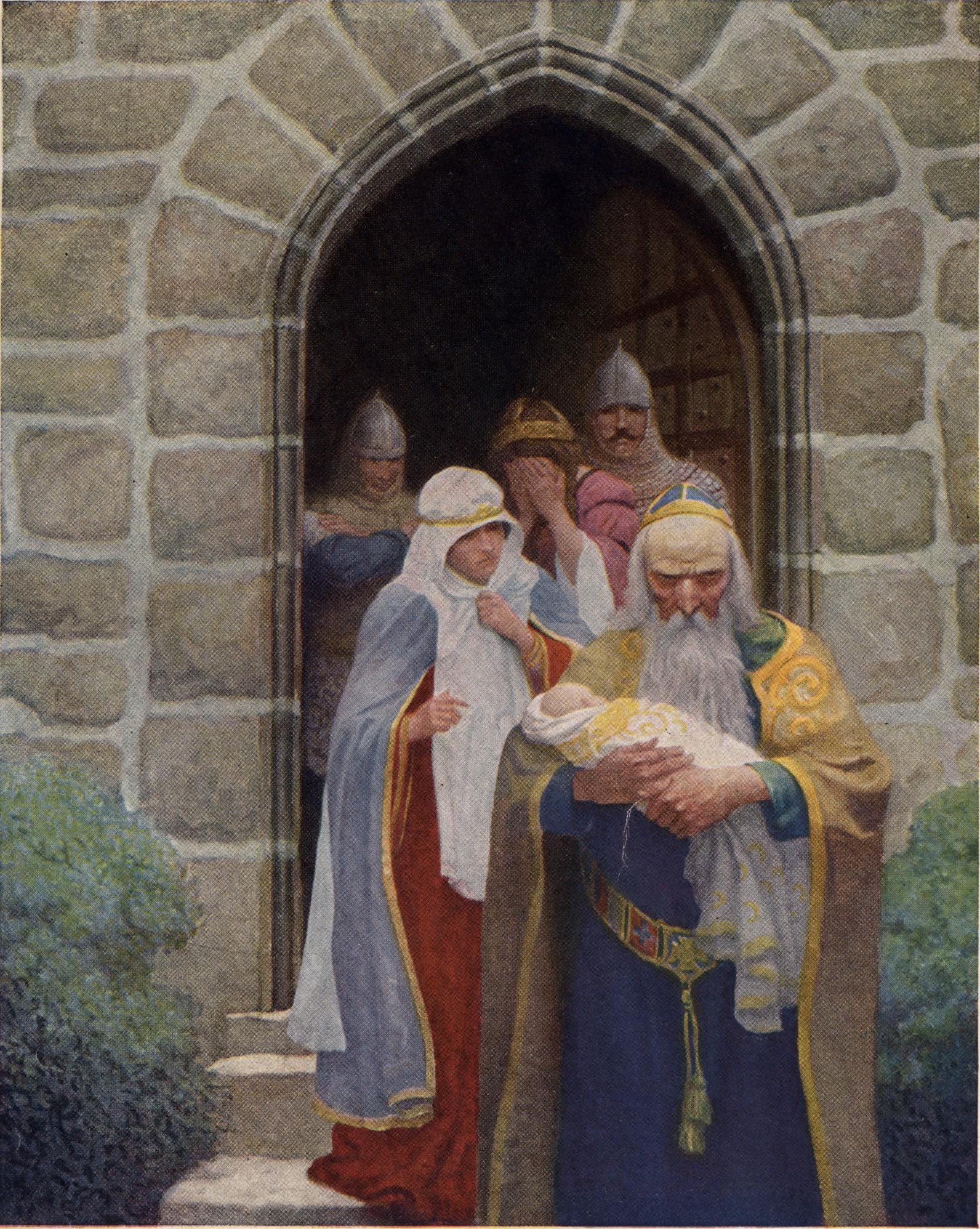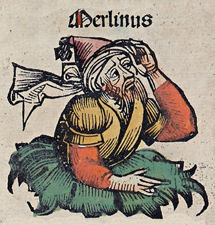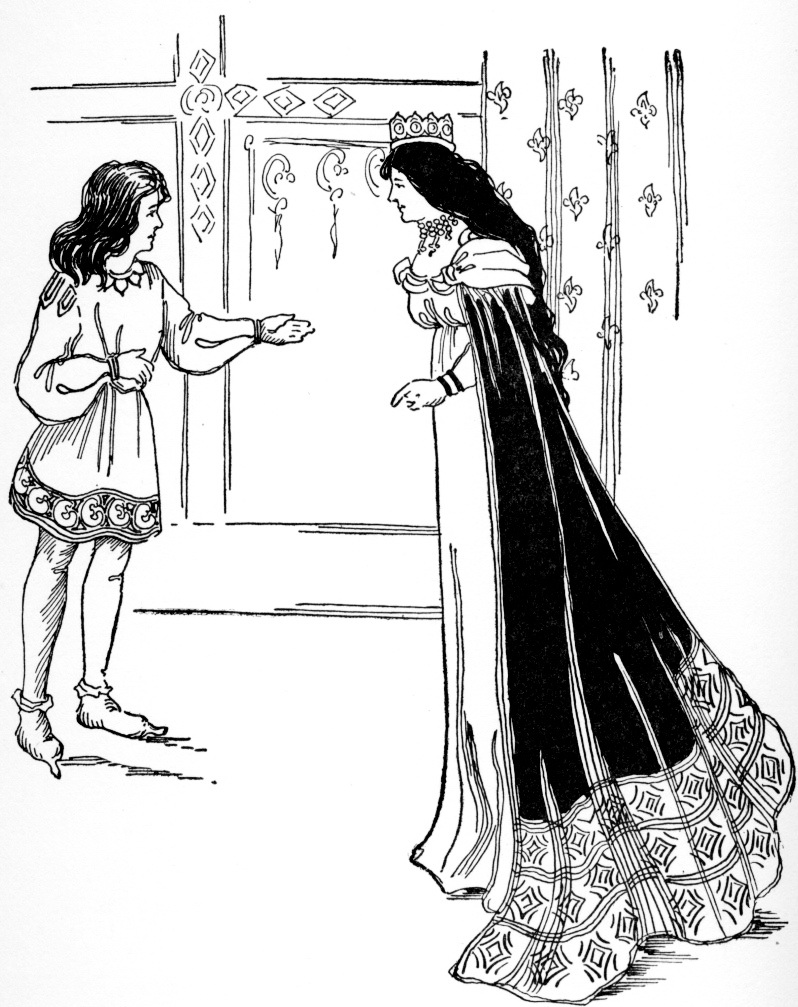|
Uther
Uther Pendragon (Brittonic) (; cy, Ythyr Ben Dragwn, Uthyr Pendragon, Uthyr Bendragon), also known as King Uther, was a legendary King of the Britons in sub-Roman Britain (c. 6th century). Uther was also the father of King Arthur. A few minor references to Uther appear in Old Welsh poems, but his biography was first written down in the 12th century by Geoffrey of Monmouth in his ''Historia Regum Britanniae'' (''History of the Kings of Britain''), and Geoffrey's account of the character was used in most later versions. He is a fairly ambiguous individual throughout the literature, but is described as a strong king and a defender of his people. According to Arthurian legend, Merlin magically disguises Uther to look like his enemy Gorlois, enabling Uther to sleep with Gorlois' wife Lady Igraine. Thus Arthur, "the once and future king", is an illegitimate child (though later legend, as found in Malory, emphasises that the conception occurred after Gorlois's death and that he w ... [...More Info...] [...Related Items...] OR: [Wikipedia] [Google] [Baidu] |
Igraine
In the Matter of Britain, Igraine () is the mother of King Arthur. Igraine is also known in Latin as Igerna, in Welsh as Eigr (Middle Welsh Eigyr), in French as Ygraine (Old French Ygerne or Igerne), in ''Le Morte d'Arthur'' as Ygrayne—often modernised as Igraine or Igreine—and in ''Parzival'' as Arnive. She becomes the wife of Uther Pendragon, after the death of her first husband, Gorlois. Geoffrey of Monmouth and Welsh tradition In Geoffrey of Monmouth's ''Historia Regum Britanniae'', Igerna enters the story as the wife of Gorlois, Duke of Cornwall. In Thomas Malory's ''Le Morte d'Arthur'', her daughters by Gorlois are Elaine, Morgause and Morgan le Fay. In the ''Brut Tysilio'', Cador of Cornwall is their son. John Hardyng's ''Chronicle'' calls Cador Arthur's brother "of his mother's syde". Geoffrey describes her as one "whose beauty surpassed that of all the women of Britain." King Uther Pendragon falls in love with her and attempts to force his attentions on he ... [...More Info...] [...Related Items...] OR: [Wikipedia] [Google] [Baidu] |
Ambrosius Aurelianus
Ambrosius Aurelianus ( cy, Emrys Wledig; Anglicised as Ambrose Aurelian and called Aurelius Ambrosius in the ''Historia Regum Britanniae'' and elsewhere) was a war leader of the Romano-British who won an important battle against the Anglo-Saxons in the 5th century, according to Gildas. He also appeared independently in the legends of the Britons, beginning with the 9th-century ''Historia Brittonum''. Eventually, he was transformed by Geoffrey of Monmouth into the uncle of King Arthur, the brother of Arthur's father Uther Pendragon, as a ruler who precedes and predeceases them both. He also appears as a young prophet who meets the tyrant Vortigern; in this guise, he was later transformed into the wizard Merlin. According to Gildas Ambrosius Aurelianus is one of the few people whom Gildas identifies by name in his sermon ''De Excidio et Conquestu Britanniae'', and the only one named from the 5th century. ''De Excidio'' is considered the oldest extant British document about the ... [...More Info...] [...Related Items...] OR: [Wikipedia] [Google] [Baidu] |
Historia Regum Britanniae
''Historia regum Britanniae'' (''The History of the Kings of Britain''), originally called ''De gestis Britonum'' (''On the Deeds of the Britons''), is a pseudohistorical account of British history, written around 1136 by Geoffrey of Monmouth. It chronicles the lives of the kings of the Britons over the course of two thousand years, beginning with the Trojans founding the British nation and continuing until the Anglo-Saxons assumed control of much of Britain around the 7th century. It is one of the central pieces of the Matter of Britain. Although taken as historical well into the 16th century, it is now considered to have no value as history. When events described, such as Julius Caesar's invasions of Britain, can be corroborated from contemporary histories, Geoffrey's account can be seen to be wildly inaccurate. It remains, however, a valuable piece of medieval literature, which contains the earliest known version of the story of King Lear and his three daughters, and helped ... [...More Info...] [...Related Items...] OR: [Wikipedia] [Google] [Baidu] |
Gorlois
In Arthurian legend, Gorlois ( cy, Gwrlais) of Tintagel, Duke of Cornwall, is the first husband of Igraine, whose second husband is Uther Pendragon. Gorlois's name first appears in Geoffrey of Monmouth's ''Historia Regum Britanniae'' (). A vassal of Ambrosius Aurelianus, his arrival at the Battle of Kaerconan ensures the defeat of Hengist.Bruce, Christopher W., ''The Arthurian Name Dictionary'', Taylor & Francis, 1999 In 's '' |
King Arthur
King Arthur ( cy, Brenin Arthur, kw, Arthur Gernow, br, Roue Arzhur) is a legendary king of Britain, and a central figure in the medieval literary tradition known as the Matter of Britain. In the earliest traditions, Arthur appears as a leader of the post-Roman Britons in battles against Saxon invaders of Britain in the late 5th and early 6th centuries. He appears in two early medieval historical sources, the ''Annales Cambriae'' and the ''Historia Brittonum'', but these date to 300 years after he is supposed to have lived, and most historians who study the period do not consider him a historical figure.Tom Shippey, "So Much Smoke", ''review'' of , ''London Review of Books'', 40:24:23 (20 December 2018) His name also occurs in early Welsh poetic sources such as ''Y Gododdin''. The character developed through Welsh mythology, appearing either as a great warrior defending Britain from human and supernatural enemies or as a magical figure of folklore, sometimes associated wi ... [...More Info...] [...Related Items...] OR: [Wikipedia] [Google] [Baidu] |
Pendragon
Pendragon or ( wlm, pen dreic, ''pen dragon''; composed of Welsh , 'head, chief, top' and / '' dragon'', 'dragon; warrior'; borrowed from the Latin word , plural , 'dragon , br, Penn Aerouant) literally means 'chief dragon' or 'head dragon', but in a figurative sense: 'chief leader', 'chief of warriors', 'commander-in-chief', , or 'chief governor'). It is the epithet of Uther, father of King Arthur in medieval and modern Arthurian literature and occasionally applied to historical Welsh heroes in medieval Welsh poetry, such as Rhodri ab Owain Gwynedd.Bromwich, Rachel, ''Trioedd Ynys Prydein'', University of Wales Press, 4th ed., 2014, p. 513 In the , one of the earliest texts of the Arthurian legend, only Uther is given the surname ''Pendragon'', which is explained by the author Geoffrey of Monmouth as literally meaning ''dragon's head''. In the prose version of Robert de Boron's ''Merlin'', the name of Uther's elder brother Ambrosius is given as ''Pendragon'', while Uter (Ut ... [...More Info...] [...Related Items...] OR: [Wikipedia] [Google] [Baidu] |
Merlin
Merlin ( cy, Myrddin, kw, Marzhin, br, Merzhin) is a mythical figure prominently featured in the legend of King Arthur and best known as a mage, with several other main roles. His usual depiction, based on an amalgamation of historic and legendary figures, was introduced by the 12th-century British author Geoffrey of Monmouth. It is believed that Geoffrey combined earlier tales of Myrddin and Ambrosius, two legendary Briton prophets with no connection to Arthur, to form the composite figure called Merlinus Ambrosius ( cy, Myrddin Emrys, br, Merzhin Ambroaz). Geoffrey's rendering of the character became immediately popular, especially in Wales. Later writers in France and elsewhere expanded the account to produce a fuller image, creating one of the most important figures in the imagination and literature of the Middle Ages. Merlin's traditional biography casts him as an often-mad being born of a mortal woman, sired by an incubus, from whom he inherits his supernatural powe ... [...More Info...] [...Related Items...] OR: [Wikipedia] [Google] [Baidu] |
Morgause
The Queen of Orkney, today best known as Morgause and also known as Morgawse and other spellings and names, is a character in later Arthurian traditions. In some versions of the legend, including the seminal text ''Le Morte d'Arthur'', she is the mother of Gawain and Mordred, both key players in the story of King Arthur and his downfall. Mordred is the offspring of Arthur's accidental incest with Morgause, the king's estranged half-sister. She is furthermore a sister of Morgan le Fay and the wife of King Lot of Orkney, as well as the mother of Gareth, Agravain, and Gaheris, the last of whom murders her. Earlier counterparts The corresponding character of Arthur's sister in Geoffrey of Monmouth's 12th-century Latin chronicle ''Historia Regum Britanniae'' is named Anna, and is depicted as a daughter of Uther Pendragon and Igraine. In Wolfram von Eschenbach's ''Parzival'', Anna is replaced by Sangive, whom the poet Der Pleier calls Seife. They are usually cast in the role of Lo ... [...More Info...] [...Related Items...] OR: [Wikipedia] [Google] [Baidu] |
Constantine III (Western Roman Emperor)
Constantine III (Latin: ''Flavius Claudius Constantinus'', died shortly before 18 September 411), was a Roman general who declared himself Western Roman Emperor in Britannia in 407 and established himself in Gaul. He was co-emperor from 409 until 411. Constantine rose to power during a bloody struggle in Roman Britain and was acclaimed emperor by the local legions in 407. He promptly moved to Gaul, taking all of the mobile troops from Britain, to confront the various Germanic invaders who had crossed the Rhine the previous winter. Constantine gained the upper hand after several battles with the forces of the Western Roman Emperor Honorius. As a result, Honorius recognised Constantine as co-emperor in 409. The activities of the invading tribes, raids by Saxons on the near-defenseless Britain and desertions by some of his top commanders led to a collapse of support. After further military setbacks he abdicated in 411. He was captured and executed shortly afterwards. Life I ... [...More Info...] [...Related Items...] OR: [Wikipedia] [Google] [Baidu] |
Madoc Ap Uthyr
In early Arthurian literature, Madoc ap Uthyr (also known as Madog or Madawg) is the son of Uther Pendragon, brother to King Arthur and father of Eliwlod. He is memorialized with "The Death Song of Madawg" () from the Book of Taliesin, which laments his death at Erof's hands; he is also mentioned in the poem ''Arthur and the Eagle''. A Madawg's grave is mentioned in , which states: Court poet Y Prydydd Bychan calls Madog both iniquitous and a celebrated lord and lists him among other heroic figures with the warning that this life is transitory. References {{Celtic mythology (Welsh) Arthurian characters Welsh mythology King Arthur's family ... [...More Info...] [...Related Items...] OR: [Wikipedia] [Google] [Baidu] |
Mordred
Mordred or Modred (; Welsh: ''Medraut'' or ''Medrawt'') is a figure who is variously portrayed in the legend of King Arthur. The earliest known mention of a possibly historical Medraut is in the Welsh chronicle ''Annales Cambriae'', wherein he and Arthur are ambiguously associated with the Battle of Camlann in a brief entry for the year 537. Medraut's figure seemed to have been regarded positively in the early Welsh tradition and may have been related to that of Arthur's son. As Modredus, Mordred was depicted as Arthur's traitorous nephew and a legitimate son of King Lot in Geoffrey of Monmouth's pseudo-historical work ''Historia Regum Britanniae'' which then served as the basis for the following evolution of the legend from the 12th century. Later variants most often characterised him as Arthur's villainous bastard son, born of an incestuous relationship with his half-sister, the queen of Lothian or Orkney named either Anna, Orcades, or Morgause. The accounts presented in t ... [...More Info...] [...Related Items...] OR: [Wikipedia] [Google] [Baidu] |
Constans II (usurper)
Constans II ( cy, Custennin) was the eldest son of the Western Roman emperor Constantine III and was appointed co-emperor by him from 409 to 411. He was killed during the revolts and fighting that ended his father's reign. Career The elder son of Claudius Constantine and brother of Julian, Constans was a monk before becoming emperor.Jones, pg. 310 In the summer of 408, his father, who had proclaimed himself Emperor the previous year in Britain and then crossed over into Gaul, proclaimed him ''Caesar'', and sent him with the general Gerontius and the prefect Apollinaris into Hispania, to rule the province and fight members of the House of Theodosius (four cousins of Honorius – Theodosiolus, Lagodius, Didymus and Verenianus) who had not recognised Constantine and had stayed loyal to the Emperor. After some initial defeats, Constans captured two of his enemies (Didymus and Verenianus), while the other two (Lagodius and Theodosiolus) fled to Constantinople. He left his ... [...More Info...] [...Related Items...] OR: [Wikipedia] [Google] [Baidu] |
_Uthr_Bendragon.jpg)

_Emrys_Wledig.jpg)





